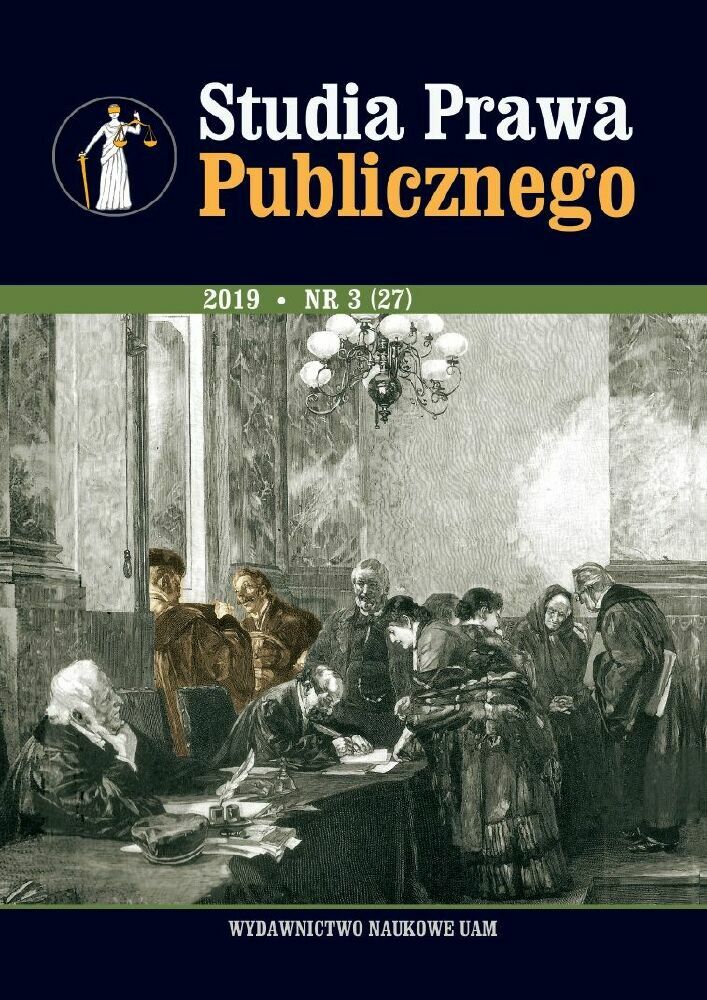Abstrakt
The subject of the article is an attempt to show that concluding an urban contract is a form of public administration activity of an administrative nature, not a civil one. As a result of the contract, an administrative-legal relationship is established. Its characteristic feature is that in order for this relationship to arise it is necessary for the other party to agree. The other party is an investor who is supposed to carry out the project at his own expense. The basis for the conclusion of the contract is not the freedom of contracting, but administrative law specifying the competence of the administration to conclude a contract as well as determining the acceptable content of the contract. The urban contract is therefore an administrative contract. The article also presents the basic features of an administrative contract. In the study, the achievements of Polish and German doctrine were used. The administrative contract is not regulated under Polish law but relevant provisions are contained in the German Act on Administrative Proceedings. In addition, a public law contract has been described as an instrument of action in the implementation of European Union law. In this context, two cases were distinguished, i.e. the conclusion of a contract by national authorities and the conclusion of a contract by the Union institutions. In the latter case, it was necessary to interpret the provisions of the Treaty on the European Union and the Treaty on the Functioning of the European Union. The characteristics of the administrative contract which make it a good means of establishing an administrative-legal relationship are also presented. Of particular importance is the opportunity of creating the content of the relationship by the entities involved. This enables the formation of individual provisions adapted to a specific case. At the same time, because the consent of both parties is needed to conclude a contract, such an administrative contract protects the interests of both parties to the legal relationship. Public administration’s ability to act in specific situations must be ensured and for that reason the administrative contract will probably develop further.
Bibliografia
Błaś A., Dyskrecjonalne uprawnienia administracji publicznej w państwie prawa, w: Z problematyki prawa administracyjnego i nauki administracji. Księga pamiątkowa z okazji 70. urodzin profesora Z. Leońskiego, pod red. Z. Janku, M. Szewczyka, M. Waligórskiego, K. Wojtczak, K. Ziemskiego, Poznań 1999.
Cieślik Z., Konstytucyjne podstawy kontraktowych działań administracji publicznej, w: Prawo administracyjne dziś i jutro, pod red. J. Jagielskiego, M. Wierzbowskiego, Warszawa 2018.
Maurer H., Allgemeines Verwaltungsrecht, München 2009.
Dumin Ł., Kuźma G., Komentarz do art. 37i ustawy o planowaniu i zagospodarowaniu przestrzennym, w: Prawo budowlane i nieruchomości. Komentarz, pod red. D. Okolskiego, wyd. 17, Warszawa 2018.
Hakenberg W., Europarecht, München 2018.
Herdegen M., Europarecht, München 2018.
Jaśkowska M., Uznanie administracyjne a inne formy władzy dyskrecjonalnej administracji publicznej, w: Instytucje prawa administracyjnego, seria System Prawa Administracyjnego, pod red. R. Hausera, Z. Niewiadomskiego, A. Wróbla, t. 1, Warszawa 2015.
Kijowski D., W sprawie charakteru prawnego umów zawieranych przez organy administracji, „Państwo i Prawo” 1987, z. 6.
Kmieciak Z, Mediacja i koncyliacja w prawie administracyjnym, Zakamycze 2004.
Gurlit E., Allgemeines Verwaltungsrecht, Hrsg. von D. Ehlers, H. Pünder, Berlin 2016.
Kruś M., Nadolny A., Czy konkurs urbanistyczny mógłby być instrumentem dyskrecjonalnego ustalania przeznaczenia terenu i warunków jego zabudowy?, w: Dyskrecjonalność w prawie administracyjnym, pod red. K. Ziemskiego, M. Jędrzejczak, Poznań 2015.
Morawski L., Główne problemy współczesnej filozofii prawa, Warszawa 2000.
Niewiadomski. Z, Komentarz do art. 37i, w: Planowanie i zagospodarowanie przestrzenne, pod red. Z. Niewiadomskiego, wyd. 10, Legalis, Warszawa 2018.
Plucińska-Filipowicz A., Kosicki A., Art. 37(i), w: Ustawa o planowaniu i zagospodarowaniu przestrzennym. Komentarz, pod red. A. Plucińskiej-Filipowicz, M. Wierzbowskiego, wyd. 3, Wolters Kluwer Polska.
Poździk R., Komentarz do art. 52, w: Komentarz do ustawy o zasadach realizacji programów w zakresie polityki spójności finansowanych w perspektywie finansowej 2014–2020, pod red. R. Poździka, Warszawa 2016.
Przybysz P., Kodeks postępowania administracyjnego. Komentarz, Warszawa 2007.
Schoch F., Miejsce administracji w strukturze podziału władz w warunkach aktualnych zadań administracji, w: Kierunki rozwoju prawa administracyjnego. Podstawowe zagadnienia prawa budowlanego i planowania przestrzennego, pod red. H. Bauera, R. Hendlera, P.M. Hubera, B. Popowskiej, T. Rabskiej, M. Szewczyka, Poznań 1999.
Licencja
Prawa autorskie (c) 2019 Maciej Kruś

Utwór dostępny jest na licencji Creative Commons Uznanie autorstwa – Użycie niekomercyjne – Bez utworów zależnych 4.0 Międzynarodowe.

